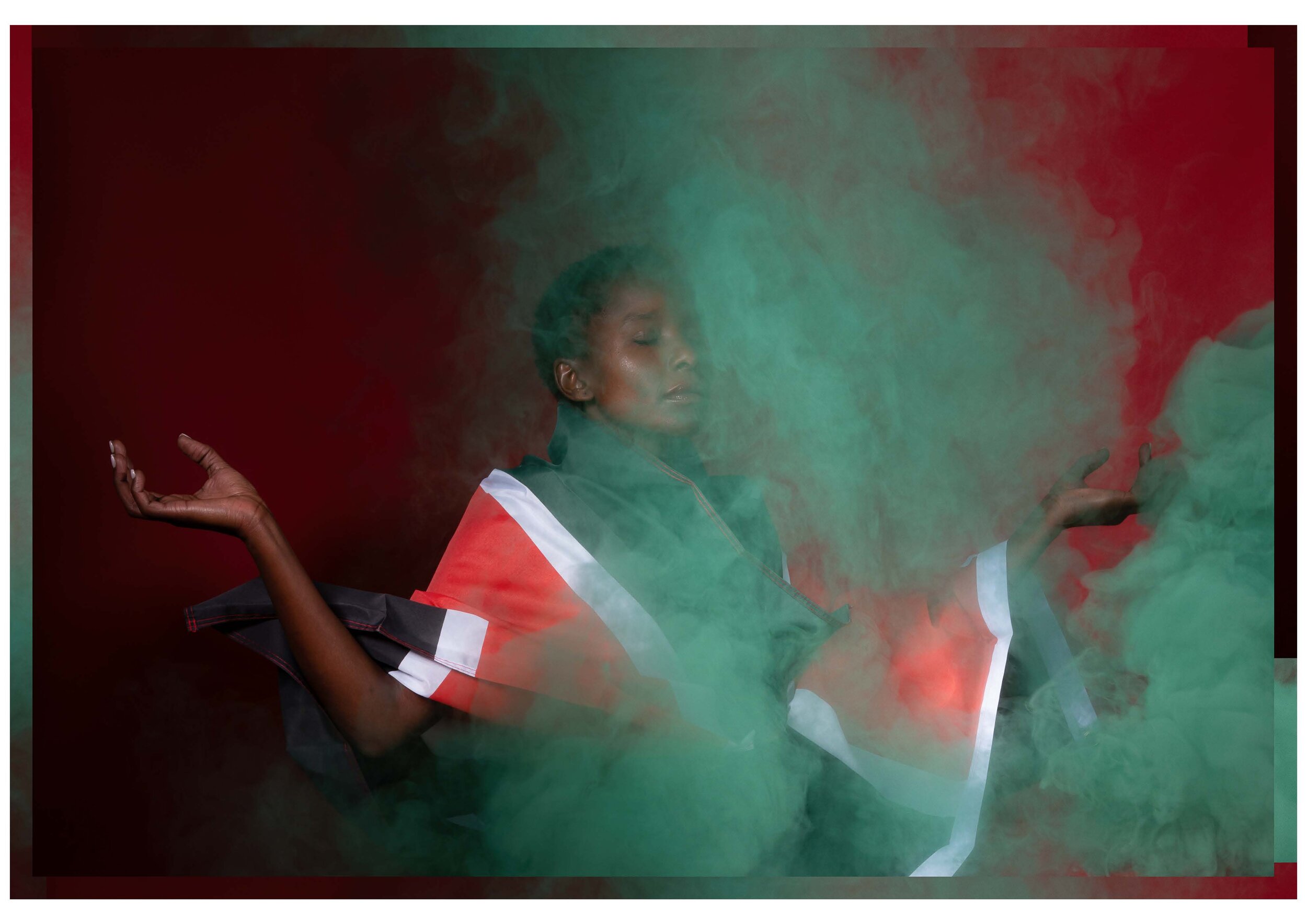Introduction /
Threshold(s) is a group exhibition, guest curated by British art historian and scholar Temi Odumosu, which explores experiences of displacement and exile by considering how people and their memories ‘crossover’ and then inhabit land, culture, identities, structures, even language.
The exhibition engages with current immigration tensions and structural practices, but with a particular focus on the ‘inbetweenness’ of movement as a state of being, which produces critical knowledge. The artists represented in Threshold(s) all have layered practices, including deep memory work, as well as, participatory and performative elements.
Situated in Nordic countries, they confront the geopolitical bordering impulse poetically, by exploring tipping points in their personal biographies that converge with wider political and historical contexts. Through them the threshold emerges as a ‘third place’, a site of/for transgression, a turning point, a leap, an ending, a beginning.
Saba Bereket Persson, THE UNSPOKEN – About unconscious discrimination (2015/2019). Installation with mannequins, textile, and video, dimensions variable, video 16:58 min. Courtesy of the artist
Immigration law is severe, and its lexicon of words and mechanisms for control have also inspired this intervention. In this vocabulary border crossings are characterised as transactional (status, visa, authorise, qualify, sponsor, admission), and people on the move are viewed as alien-others petitioning for rights of access to resources.
Here the ‘border’ emerges as a loaded concept; described simply as a dividing line between territories, but negotiated as a shifting entity that is physical and psychological, sometimes rigid (a wall) and other times porous.
‘The border is a word game’. Current immigration practices, laws, and language are also haunted by colonial inheritances as part of ‘the afterlife of property;’ extensions of the historical violations wrought by slavery, invasion and theft of land and people, appropriation of natural resources, and surveillance of bodies-as-assets.
This coloniality of power erodes and effects how flight and movement are represented today, and more importantly how societies deal with human connection in the space of unknowing.
We therefore ask: What is happening at the thresholds of migration experiences? Where is the place of belonging? When and how will things change?
Yong Sun Gullach, The Starchild (2019). 3D / 360 installation based on live performance, 110 x 100 x 250 cm. Courtesy of the artist
> Download exhibition catalog
dansk / English
> Reviews
Press contact /
Creative director Frederikke Hansen
frederikkehansen@campcph.org
(+45) 60 73 19 15 (cell)
(+45) 72 14 07 66 (main)
Michelle Eistrup, BeLONGING Vexillum (2016). 6 x framed color photos 74 x 109 cm. Courtesy of the artist
Contributors /
Exhibition and events /
Pia Arke
Michelle Eistrup
Yong Sun Gullach
Luanda Carneiro Jacoel
Saba Bereket PerssonCatalog /
Jean Claude Mangomba
Temi Odumosu
Pia Arke, My Mother Told Me (We live of seal) (1988). Courtesy of Søren Arke Petersen and the Pia Arke Estate
About the curator /
Temi Odumosu is Senior Lecturer in Cultural Studies at Malmö University. Her research and curatorial practices are concerned with colonial archives/archiving, slavery and visuality, Afro-Diaspora art, performance of memory, and ethics of care-in-representation. She is author of Africans in English Caricature 1769-1819: Black Jokes, White Humour (2017), which recently won the Historians of British Art book prize for scholarship between 1600-1800.
Practical info /
Threshold(s) is the third exhibition in CAMP’s new 2-year exhibition program State of Integration: Artistic analyses of the challenges of coexistence, in which some of the most visionary curators and artists of today will examine why immigration poses such a major challenge to the West, and how refugees, immigrants, and diaspora populations experience demands of integration or assimilation into the majority culture.
The exhibition is guest curated by Dr. Temi Odumosu and runs from Oct. 4, 2019 – Feb. 1, 2020.
Luanda Carneiro Jacoel, Still from Kalunga Unspoken (2018). Video still. Courtesy of the artist
More about the exhibition /
Threshold(s) shows works and performances that examine acts of ‘crossing over’. These acts can happen in different ways; the physical act of the body moving across thresholds. The act of learning a language or an attempt to dwell in a new place.
In 1988 Pia Arke was commissioned to illustrate menu cards for Scandinavian Airlines Greenlandic Polar Class. Arke produced My Mother Told Me, which is a series of six painted images that blur the relationship between lived and inherited memories of a place called home, and the imaginary of that place within a wider culture. Pia Arke's mother was one of the first settlers within the Greenlandic community on Scoresbysund/Ittoqqortoormiit, which was a town colonised by 21 Danish people in 1924, in an attempt to gain territorial control over North-East Greenland. Over the course of her career, Arke's work repeatedly engaged with this history of contact and settlement, as it impacted individual families as well as the environment, in a place she once described as the "somewhere" in the "middle of nowhere".
“I make the history of colonialism part of my own history in the only way I know, namely by taking it personally.”
An immediate glance across Pia Arke’s yet unfolding oeuvre, makes it clear that from the beginning Arke was on some kind of investigation.
Born on the easternmost tip of Greenland, in the town of Ittoqqortoormiit Arke was raised by her Danish father and Inuit mother. When aged 13, Arke was sent off to boarding school in Denmark.
At age 29, Arke enrolled at the Royal Danish Academy of Fine Arts where she developed her talents as a visual artist and thinker. She graduated with a thesis titled ‘Ethno-Aesthetics’, the essay that since showed to be fundamental to the following years of Arke’s personal-political venture.
Arke’s approach may best be described as a form of practice-based research: While her work is skillfully executed and aesthetically pleasing, it also has a rough and candid feel to it. A multimedial weaving of research and introspection, makes each artwork another piece of evidence to a mystery yet to be resolved. Arke’s solemn and unassuming approach seem almost like that of a secret agent.
Michele Eistrup (Denmark) investigates the notion of beLONGING and what it means to be split between two or more spaces of cultural heritage, and exploring this idea through each individual’s personal affilitation to this concept and how they define it. Feeling at home, in exile, with distance, and the split of partaking in different societies and yet close to both.
Yong Sun Gullach (Denmark) investigates the ritual-burden, that the colonized body experiences by attaching objects hindering bodily balance and movement. The performance investigates the material, the audience and the body that leave traces – a bodily mark-a scar-scarification. The tactility of the materials both shapes and carry a clear reference to the colonization of Southeast and East Asia focusing on the female body and the commodification of her womb and sexuality.
With Kalunga Unspoken, Luanda Carneiro Jacoel (Brazil/Norway), reflects on the notion of being and belonging throughout the Black Atlantic history. The perspective of the word and the image as a places of speech guide us into a synesthetic experience of vision, sound, text and movement; which involves our senses, awareness and openness, to just be there, becoming. It is a journey in a nomadic state where our body-memory selects events in the past, present and future, without hierarchy, without order.
In The Unspoken, Saba Bereket Persson (Sweden) works with questions about adapted patterns in relation to skin color and fear the unknown. She examines unconscious discrimination based on her experience of living in Sweden with a different skin color and using results of survey questions based on the most common prejudice about black people in Sweden.
Events & Education Program /
Opening /
CAMP invites the public to the opening of Threshold(s) on Friday, Oct. 4, 2019, from 6 pm–12 am.
Program
6–6:30:
Welcome / by CAMP's directors and guest curator Temi Odumosu
6:30–7:15:
Exhibition viewing in CAMP and community dinner in Trampoline House
7:15–8:
The Starchild / performance by Yong Sun Gullach
8–9:
Afro-fusion live music set / by Maria Thandie and Deodato Siquir
9–12:
Party / with DJs from Trampoline House and bar
Guided tours /
Saturdays 3–4 pm during the period Oct. 15 – Dec 14, 2019 (closed every last Saturday of the month)
Every Saturday during the exhibition period, you can get a free guided tour in the exhibition Threshold(s). The tours are conducted by graduates from CAMP’s art gallery guide program for refugees and asylum seekers in collaboration with CAMP education interns. The tours are conducted in English. Admission DKK 40/€ 5/$ 5. Free admission for migrant workers and people in the asylum system. Click here for dates.
Exhibition catalog /
The exhibition is accompanied by a catalog that will be available in November 2019.











